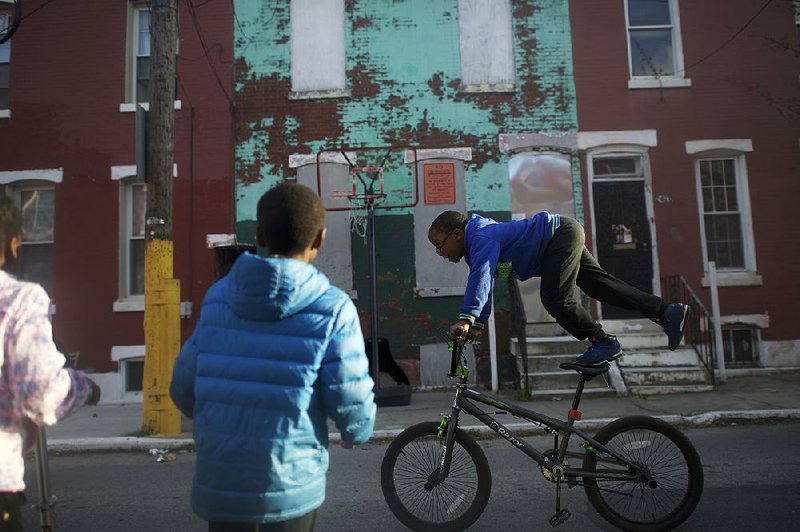PHILADELPHIA -- Seeking to do more than provide basic homes for its residents, Philadelphia's public housing agency is taking a new approach to neighborhood revitalization by adding commercial and educational development to its main role of home building, aiming to address the underlying causes of urban distress.
In the northern part of the city, the Philadelphia Housing Authority is razing part of the Norman Blumberg Apartments in the Sharswood neighborhood, which has had especially high rates of poverty, crime and urban blight. The agency plans to attract shops, offices and schools, along with housing, in an expansive program to breathe life into a struggling community.
The $500 million project, just 2 1/2 miles from downtown Philadelphia, aims to re-create a middle-class community that never recovered after being ravaged by rioting in the 1960s, agency officials say.
Two high-rise apartment buildings from the late 1960s that had become symbols of urban decay were imploded in mid-March in the most conspicuous stage so far of the project. Other dilapidated housing has also been removed.
Under the multiyear Sharswood Blumberg Choice Neighborhoods Transformation Plan, commercial development and new or reopened public schools, as well as fresh housing, will offer the neighborhood its best chance of recovery, said Kelvin Jeremiah, president of the Philadelphia Housing Authority.
"We never really came up with a comprehensive approach that went beyond housing," Jeremiah said. "If you only focus on housing, what about the crime issues? What about amenities? What about the education?"
Under the plan, the destroyed towers, as well as some other low-rise apartment buildings on the 8-acre site, will be replaced by 1,200 new housing units. Most will be for rent or sale at below-market prices. The first phase of the construction, containing 57 units, is underway and is due for completion this fall.
Central to the vision will be the creation of a commercial corridor along Ridge Avenue, the neighborhood's main street, which lost businesses as the local economy declined.
In all, the plan projects 400,000 square feet of commercial space. The agency said it was close to making a deal for a drugstore and a supermarket. It is also seeking agreements with other businesses such as banks, Jeremiah said.
The housing authority plans to move its headquarters to the street from downtown, along with about 1,100 employees, who will bolster demand for businesses.
Jeremiah said the agency was in talks with some private developers who were attracted to the project because of its proximity to adjoining neighborhoods like Brewerytown to the west and Francisville to the southeast. In those neighborhoods, construction is popping up and property prices are rising as a real estate boom ripples outward from downtown, or Center City, Philadelphia, with residents seeking more affordable options.
The Michaels Development Co., a developer of affordable housing, plans to build 42 affordable rental units in Sharswood. The company's senior vice president, Milton Pratt Jr., said the neighborhood was well positioned to turn itself around given the buoyant market nearby and its proximity to Center City.
"This is one of the most attractive neighborhoods in the city for redevelopment," Pratt said.
Similar efforts to involve private developers in public housing projects have taken place in Chicago. Molly Sullivan, a spokesman for the Chicago Housing Authority, said the agency had redeveloped several neighborhoods by combining public and market-rate housing with commercial development.
The New York City Housing Authority offers commercial space at market rates to businesses like dry cleaners, delis, supermarkets and barbershops.
Philadelphia officials say that the city's revitalization plan also depends on providing public schools to replace two that shut down in 2013. The housing authority is working with the school district and Big Picture Learning, an educational nonprofit, to decide whether to reopen the shuttered schools or build anew, said Nichole Tillman, a spokesman for the housing agency.
The project has attracted support from the U.S. Department of Housing and Urban Development, which awarded it a $500,000 planning grant under its Choice Neighborhoods program. Jane Vincent, an administrator for the federal agency, said the grant reflected the project's potential and federal, state and local involvement.
"It really is transforming the neighborhood," she said.
About 500 families were temporarily relocated to low-income housing elsewhere in the city while the project takes shape.
To create space for the new housing, the agency has been buying property from residents, but it has met resistance from some who say it has offered prices far below market value. In some cases, the agency has used eminent domain to acquire parcels.
Michael Scott, a resident of Sharswood since 1969, said the agency offered him about $60,000 for a house, a commercial building and a vacant lot that he said together were worth about $300,000. He rejected the offer.
Sitting on a wooden fence bordering one of the neighborhood's 1,300 vacant lots, Scott, 49, said he welcomed the revival plan because "it's time for the neighborhood," but he is waiting for a higher offer for his property.
A neighbor, Kim Wong, 69, said the housing authority offered him $28,000 for his house, one of only three still standing on his block. He said the property was worth $105,000.
Tillman said the housing agency was committed to giving residents fair prices for their properties, and owners were entitled to a reappraisal at the agency's expense if they were dissatisfied with an offer.
David Scolnic, a real estate lawyer with the Philadelphia firm Hangley Aronchick Segal Pudlin & Schiller, said the redevelopment plan had great potential to improve one of Philadelphia's poorest neighborhoods. But its success, he added, hinges on whether new businesses can be persuaded to open there.
"The key to the whole development is how quickly can you get people back into the neighborhood, and that will give the retailers a chance to succeed if there are sufficient residents there," Scolnic said. "If it works, it could be a model for similar developments nationwide."
SundayMonday Business on 05/08/2016

